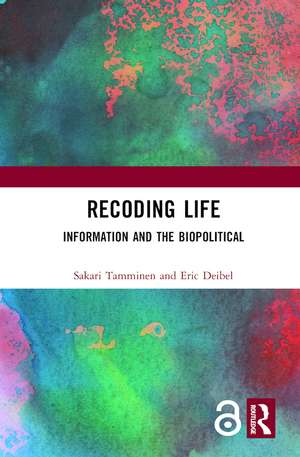Recoding Life: Information and the Biopolitical
Autor Sakari Tamminen, Eric Deibelen Limba Engleză Hardback – 26 iul 2018
The book’s approach is captured in the title, which refers to 'the biopolitical'. The authors argue that through discussions of political theories of sovereignty and related geopolitical conceptions of nature and society, we can understand how crucially important it is that life is constantly unsettling and disrupting the established and familiar ordering of the material world and the related ways of thinking and acting politically. The biopolitical dynamics involved are conceptualised as the 'metacode of life', which refers to the shifting configurations of living materiality and the merging of conventional boundaries between the natural and artificial, the living and non-living. The result is a globalising world in which the need for an alternative has become a core part of its political and legal instability, and the authors identify a number of possible alternative platforms to understand life and the living as framed by the 'metacodes' of life.
This book will appeal to scholars of science and technology studies, as well as scholars of the sociology, philosophy, and anthropology of science, who are seeking to understand social and technical heterogeneity as a characteristic of the life sciences.
| Toate formatele și edițiile | Preț | Express |
|---|---|---|
| Paperback (1) | 257.28 lei 6-8 săpt. | |
| Taylor & Francis – 6 dec 2019 | 257.28 lei 6-8 săpt. | |
| Hardback (1) | 997.38 lei 6-8 săpt. | |
| Taylor & Francis – 26 iul 2018 | 997.38 lei 6-8 săpt. |
Preț: 997.38 lei
Preț vechi: 1216.32 lei
-18% Nou
Puncte Express: 1496
Preț estimativ în valută:
190.88€ • 197.76$ • 159.30£
190.88€ • 197.76$ • 159.30£
Carte tipărită la comandă
Livrare economică 22 martie-05 aprilie
Preluare comenzi: 021 569.72.76
Specificații
ISBN-13: 9781138225572
ISBN-10: 1138225576
Pagini: 172
Ilustrații: 4 Halftones, black and white; 2 Tables, black and white; 4 Illustrations, black and white
Dimensiuni: 156 x 234 x 11 mm
Greutate: 0.37 kg
Ediția:1
Editura: Taylor & Francis
Colecția Routledge
Locul publicării:Oxford, United Kingdom
ISBN-10: 1138225576
Pagini: 172
Ilustrații: 4 Halftones, black and white; 2 Tables, black and white; 4 Illustrations, black and white
Dimensiuni: 156 x 234 x 11 mm
Greutate: 0.37 kg
Ediția:1
Editura: Taylor & Francis
Colecția Routledge
Locul publicării:Oxford, United Kingdom
Public țintă
Postgraduate and UndergraduateCuprins
List of Tables
List of Figures
Acknowledgements
1. Recoding Life: Information and the Biopolitical
2. Rethinking the Biopolitical
3. Read, Write, Standardise
4. Crossing Boundaries: The Global Politics of Access and Plants as Species of Life™
5. Animal Genetic Resources as A Global Matter of Concern
6. Recoding Synthetic Life : From Openness to (Free as in) Freedom
7. Rethinking the Age of Biology: Biomass, Biohacking, and Open Source Seeds
8. The Re-Articulation of Biopolitical Theory in an Era of Informatics
List of Figures
Acknowledgements
1. Recoding Life: Information and the Biopolitical
2. Rethinking the Biopolitical
3. Read, Write, Standardise
4. Crossing Boundaries: The Global Politics of Access and Plants as Species of Life™
5. Animal Genetic Resources as A Global Matter of Concern
6. Recoding Synthetic Life : From Openness to (Free as in) Freedom
7. Rethinking the Age of Biology: Biomass, Biohacking, and Open Source Seeds
8. The Re-Articulation of Biopolitical Theory in an Era of Informatics
Notă biografică
Sakari Tamminen is an Adjunct Professor of Science and Technology Studies (Anthropology of Science and Technology) at the University of Helsinki, Finland, and co-editor of Bio-Objects: Life in the 21st Century.
Eric Deibel is a postdoctoral researcher in the Department of Biotechnology at Delft University of Technology, The Netherlands, and lectures STS to engineering students at Bilkent University.
Eric Deibel is a postdoctoral researcher in the Department of Biotechnology at Delft University of Technology, The Netherlands, and lectures STS to engineering students at Bilkent University.
Descriere
This book addresses the unprecedented convergence between the digital and the corporeal in the life sciences and turns to Foucault’ biopolitics in order to understand how life is being turned into a technological object. The authors argue that through discussions of political theories of sovereignty and related geopolitical conceptions of nature and society, we can understand how crucially important it is that life is constantly unsettling and disrupting the established and familiar ordering of the material world and the related ways of thinking and acting politically. As such, the book will appeal to scholars of science and technology studies, as well as scholars of the sociology, philosophy and anthropology of science, who are seeking to understand social and technical heterogeneity as a characteristic of the life sciences.
